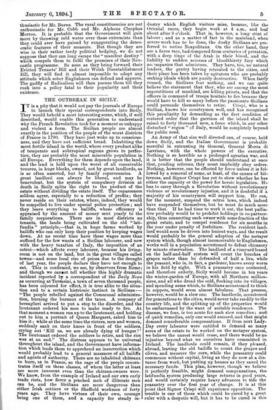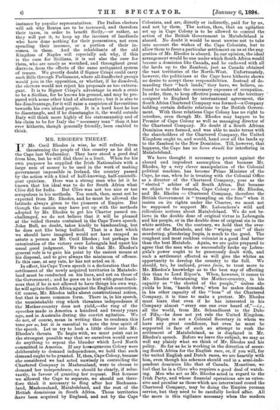THE OUTBREAK IN SICILY.
IT is a pity that it would not pay the journals of Europe to launch their special correspondents into Sicily. They would behold a most interesting scene, which, if well described, would enable this generation to understand why the French Revolution took for a moment so unhappy and violent a form. The Sicilian people are almost exactly in the position of the people of the worst districts of France in 1790. They have just woke up to conscious- ness, and they have not sufficient bread. Inhabiting the most fertile island in the world, where every product alike of temperate and subtropical regions grows to perfec- tion, they are probably the most miserable population in all Europe. Everything for them depends upon the land, and the land is held upon the worst of all conceivable tenures, in huge blocks, owned, not by great landlords, as is so often asserted, but by family coparcenaries. A great landlord can always be liberal, and may be benevolent, but the system of compulsory division at death in Sicily splits the right to the product of the estate without dividing the estate itself. The coparceners seldom agree, especially to a reduction of profits ; they never reside on their estates, where, indeed, they would be compelled to live under special police protection ; and they leave everything to bailiffs, whose efficiency is appraised by the amount of money sent yearly to the family corporations. There are in most districts no tenants, the lands being cultivated on the old " lati- fundia " principle,—that is, in huge farms worked by bailiffs who can only keep their position by keeping wages down. At no recent time have these wages more than sufficed for the few wants of a Sicilian labourer, and now with the heavy taxation of Italy, the imposition of an octroi—which affects every labourer, because his living- room is not on the land, but in th,e great villages called towns—and some local rise of prices due to the drought of last year, the people declare they have not enough to eat. This is confirmed, we see, by observers from Rome; and though we cannot tell whether this highly dramatic incident reported by a correspondent of the Daily News as occurring at Terrasini, a town of seven thousand people, has been coloured for effect, it is true alike to the situa- tion and to a certain histrionic instinct in Sicilians :— "The people rebelled against the Communal administra- tion, burning the bureaux of the taxes. A company of bersaglieri arrived to put a stop to the disorder, and the lieutenant ordered his men to make ready to fire. At that moment a woman ran up to the lieutenant, and holding out to him a portrait of Queen Margaret, asked him to kiss it ; while at the same time the rioters, men and women, suddenly sank on their knees in front of the soldiers, crying out Kill us, we are already dying of hunger ! ' The lieutenant ordered the soldiers to retire, and the riot was at an end." The distress appears to be universal throughout the island, and the Government have informa- tion which leads them to apprehend an insurrection which would probably lead to a general massacre of all bailiffs and agents of authority. There are no inhabited chateaux to burn, as in France, so the rage of the people concen- trates itself on these classes, of whom the latter at least are more innocent even than the chateau-owners were. We know, from the example of Ireland and our own early trade riots, how fierce a pinched mob of illiterate men can be, and the Sicilians are more dangerous than either Irish cottiers or the Sheffield workmen of forty years ago. They have virtues of their own, courage being one of them, and a capacity for steady in- dustry which English visitors miss, because, like the Oriental races, they begin work at 4 a.m., and loaf about after 3 o'clock. That is, however, a long stint of labour ; and as a matter of fact in the mainland, when severe work has to be done, the dusky Sicilians are pre- ferred to native Neapolitans. On the other hand, they are a fierce race, bad-tempered from centuries of privation, with a deep tinge of the Arab in their blood, and the liability to sudden accesses of bloodthirsty fury which acompanies that admixture. They have, too, no natural leaders, the gentry having retreated to the cities, and their place has been taken by agitators who are probably seeking ideals which are purely destructive. When fairly roused, the Sicilians fear nothing, and we can quite believe the statement that they, who are among the most superstitious of mankind, are killing priests, and that the officers in command of troops hesitate to fire because they would have to kill so many before the passionate Sicilians could persuade themselves to retire. Crispi, who is a Sicilian, knows his countrymen well, and has recognised this peculiarity by demanding as the first condition of restored order that the garrison of the island shall be raised to forty thousand men, a force which, in any other disturbed " region " cf Italy, would be completely beyond the public need.
An Army of that size well directed can, of course, hold down Sicily, and the Italian Government is probably merciful in entrusting its General, General Mona di Lavriano, with the whole powers of the executive. Nothing is so horrible as a prolonged agrarian war, and it is better that the people should understand at once that, pending reforms, they must implicitly obey orders_ Nothing, however, can be effected by force unless it is fol- lowed by a removal of some, at least, of the causes of bit- terness, and Signor Crispi has yet to show whether he has either the capacity or the power for heroic legislation. He has to carry through a Revolution without revolutionary violence or revolutionary injustice, and it is doubtful if a majority of his countrymen will support him. He cans for the moment, suspend the octroi laws, which indeed have suspended themselves, but he must do much more than that. If he had time to work it out, the best pallia- tive probably would be to prohibit holdings in co-partner- ship, thus connecting each owner with some fraction of the great estate, and to compel residence for six months in the year under penalty of forfeiture. The resident land- lord would soon be driven into lenient ways, and the result would probably be the general adoption of the metayer system which, though almost inconceivable to Englishmen, works well in a population accustomed to defeat chicanery by minute observation. The landlord of a vineyard leased on the half-and-half system will count the bunches of grapes rather than be defrauded of half a lira, while the peasant, who is, in fact, a gardener, knows every worm in his field by sight. With a peasantry once contented, and therefore orderly, Sicily would become in ten years the winter-garden of Europe, with all Northern million- aires, and all who dread the cold, flocking into its villages, and spending sums which, to Sicilians accustomed to think- in coppers, would seem almost fabulous. That prooess, however, would be a slow one. The landlords, accustomed for generations to the cities, would never take readily to the country life, and the splitting up of the properties would be embarrassed by the want of suitable residences. The disease, we fear, is too acute for such slow remedies ; and. of quick remedies, only one would succeed, and that might demand considerable compensations. If from next Lady- Day every labourer were entitled to demand so many acres of the estate to be worked on the metayer system, we believe the unrest would cease, and there would be no injustice beyond what we ourselves have committed in Ireland. The landlords could remain, if they pleased,. abroad, leaving the old bailiffs to count the grapes and olives, and measure the corn, while the peasantry could, commence without capital, living as they do now at a dis- tance from work, but putting up houses as they saved the necessary funds. This plan, however, though we believe it perfectly feasible, might demand compensations, the latifundia system producing large returns in good years, and would certainly require heavy advances to tide the peasantry over the first year of change. It is at this point that Signor Crispi will experience opposition. The trouble is one of those which could be cured by a great ruler with a despotic will, but it has to be cured in this instance by popular representatives. The Italian electors will ask why Rentes are to be increased, and therefore their taxes, in order to benefit Sicily,—or rather, as they will put it, to keep up the incomes of landlords who have done nothing for their possessions, not even spending their incomes, or a portion of their in- comes, in them. And the inhabitants of the old Kingdom of Naples will especially ask why, if this is the cure for Sicilians, it is not also the cure for them, who are nearly as wretched, and throughout great districts, from the effects of the same antiquated system of tenure. We greatly doubt if Signor Crispi could carry such Bills through Parliament, where all disaffected groups would join in the opposition, or whether, if he dissolved, the electors would not reject his proposals as too extrava- gant. It is to Signor Crispi's advantage in such a crisis to be a Sicilian, for he knows his ground, and may be pre- pared with some other kind of alternative ; but it is also to Psis disadvantage, for it will raise a suspicion of favouritism towards his own island people. It is a hard knot he has to disentangle, and if he disentangles it, the world outside Italy will think more highly of his statesmanship and of his claim to be for Italy the " necessary man " than it has ever hitherto, though generally friendly, been enabled to think.











































 Previous page
Previous page